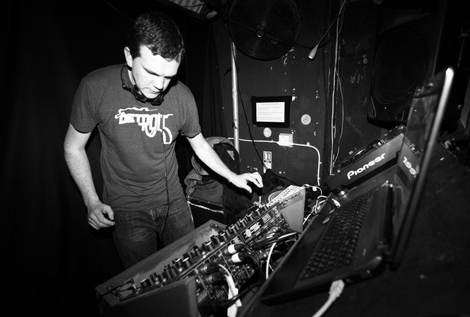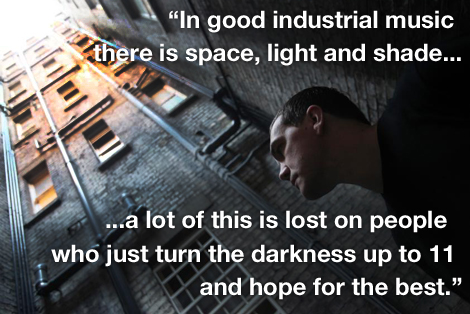
Ali Wells, the producer known as Perc, has been responsible for some of the most idiosyncratic techno in recent memory. His 2011 Wicker & Steel LP was a triumphant amalgamation of decayed sound design and rough functionality, grounded to a haunted evocation of England. His Perc Trax label continues apace, having already delivered one of the years most vital LPs in the form of Forward Strategy Group’s Labour Divison. Industrial influences, both aesthetic and musical, run to the core of the label and LWE caught up with Ali to discuss this musical grounding.
Where does your interest in industrial music stem from?
Ali Wells: Industrial music first came to my knowledge when I was at school around the age of 16. A lot of my friends listened to a wide range of guitar music — indie, metal, baggy etc, and Nine Inch Nails’ Pretty Hate Machine was a big album for us at the time. Despite being a very different side of industrial music compared to Throbbing Gristle et al. it still provided an initial gateway to the sound. The same can be said for some of the earlier Depeche Mode albums. Around the same time I also bought a Cabaret Voltaire album purely for the two Altern8 remixes on it. This introduced me to the classic early UK industrial acts and once you start listening to Cabaret Voltaire, then it’s a natural progression to move on to Throbbing Gristle, Clock DVA et al.
How has industrial influenced your own music making?
There is open-mindedness in industrial music that is inspiring to me, a feeling that anything can and will be used to convey a mood or feeling. In the music I hear a controlled, focused aggression and that is something that interests me a lot. As soon as you realize that there is more to industrial music than clanging metallic percussion and dark, somber atmospherics then a whole new world opens up to you. There is also a lot more rhythmic interest and variation in this music especially when compared to the current wave of rhythmically simplistic techno and that is something I have always aimed for in my music.

Do you think there is a misconception that industrial has to be “hard and nasty”?
Of course. It’s the same with any genre that enjoys its cyclical period of attention and popularity, people that do not have a deep understanding of the genre dive in to get a slice of the action and replicating the first few signifiers of that genre that they hear. Producers new to this music assume that harder and bleaker is the way to be “industrial.” In good industrial music there is space, light and shade, moments of humor and a balance between hard and soft. Sadly a lot of this is lost on some people who just turn the darkness up to eleven and hope for the best.
Both Wicker & Steel and A New Brutality carry a very English aesthetic. How important are your surroundings to your music making?
There is a link between my surroundings and the music I make, but then again if I set up a studio overlooking a beach in Hawaii then I would still make this kind of music. Wicker & Steel was always meant to be a balance between my current urban experiences and the held memories of my childhood and youth growing up in the countryside outside of London, whilst A New Brutality is completely urban its outlook. I don’t purposely make music that sounds English but I do avoid anything that might prompt people to make a direct connection between my music and the established sounds of Berlin, Detroit or any other key techno city.
Do you think techno’s functionality can hinder creativity?
The vast majority of techno at present is not really boundary pushing and for a genre that has enjoyed years of promoting itself as future music, right now it is more retrospective than ever. Of course there is great music coming out every week that sounds fresh, but like any genre it has its fair share of copyists and bandwagon jumpers. I think there has always been a balance between functionality and creativity. Anyone with half a brain knows which arrangements and production techniques send a crowd crazy, the making of an artist is whether you resort to these cheap clichés or try and push forward and do something that can still get a reaction on the dance floor whilst introducing people to original ideas.
How important is the visual side of music to you? A New Brutality seems like a real statement of intent…
It never used to be. In years gone by I wanted the most basic artwork, that old cliché of letting the music do the talking, but especially since Perc Trax started doing albums I have really enjoyed expressing myself and the label’s philosophy visually as well as musically. Wicker & Steel only felt like an actual album to me when I saw the final cover and now the music and the cover are inseparable in my mind. For the video for A New Brutality I wanted something that was violent and aggressive without any actual images of violence, war, weaponry etc. Color was also important, to break away from the monochrome, dystopian look of so much techno right now, including previous Perc Trax releases. Good artwork takes imagination, effort, time and money but I think it is worth it and is something that Perc Trax will explore a lot more in the future.
If you could pick three pivotal industrial tracks that mean a lot to you, what might they be and why?
Cabaret Voltaire, “Kneel To The Boss”: This manages to pull on your heartstrings despite having just two chords and offers a different mood to most industrial music. It also shows a dub influence on industrial music from this period that seems to have totally disappeared from modern industrial music. Possibly my favorite CV track and definitely the one I listen to the most.
Einstürzende Neubauten, “Kollaps”: Spacious and freeform with a ceremonial almost pagan feel to it, this is classic Neubauten and shows there is more to EN than just metal pipes and road drills. Not being able to understand the German language vocals gives them an extra impact to me, making them sound more primal and animalistic.
Throbbing Gristle, “Very Friendly”: The blueprint for a thousand low quality clones, but TG did it before anyone else and did it better than anyone else. You can see how this track opened up an arms race of bands trying to “out dark” each other with tales of murders and sexual crimes over bleak, distorted soundscapes but there is an intelligence and subtlety to TG that most of the copyists lacked.













Excellent -these 3 tracks of Ali’s are also favourites of mine: I played Very Friendly in my Sixth Form common room to cause confusion, Kneel to the Boss was my one of my fave stoner Uni tracks (the whole album actually) and Kollaps was the first proper industrial album I bought as a 16 y/o, mailorder from Resurrection Records London -the track itself is blood-curdling yet beautiful. A fantastic, if too brief, interview from one my new favourite artists about my favourite music genre.
Ripping piece; not one question or answer felt superfluous. I love the concept behind the “New Brutality” clip, too. It’s just further proof to me that Ali puts genuine thought into everything he does, though that’s already evident judging by his music alone.